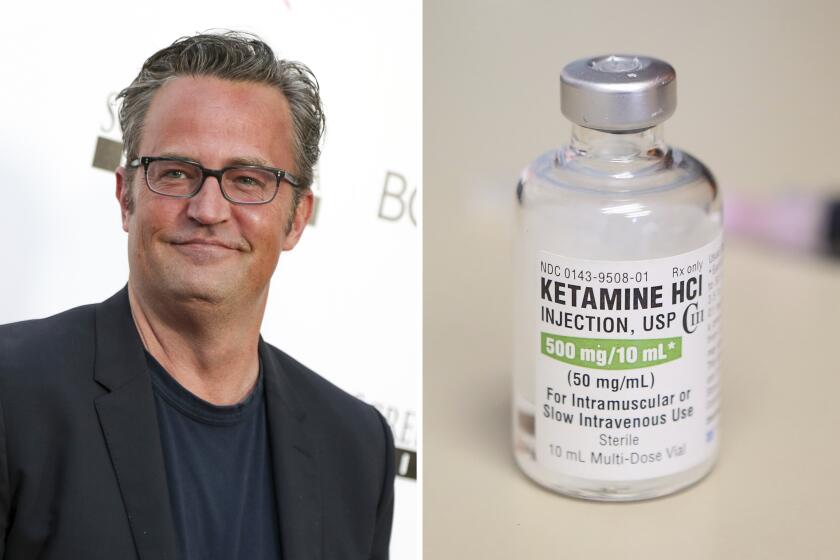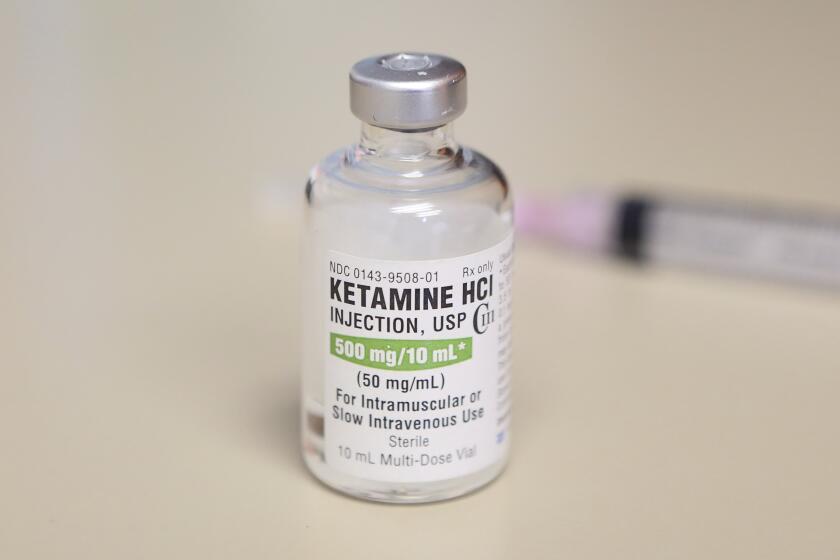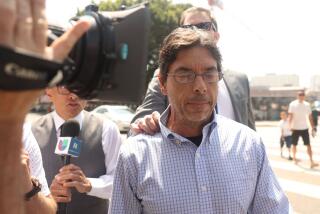Matthew Perry’s doctor still seeing patients after being charged in actor’s ketamine death
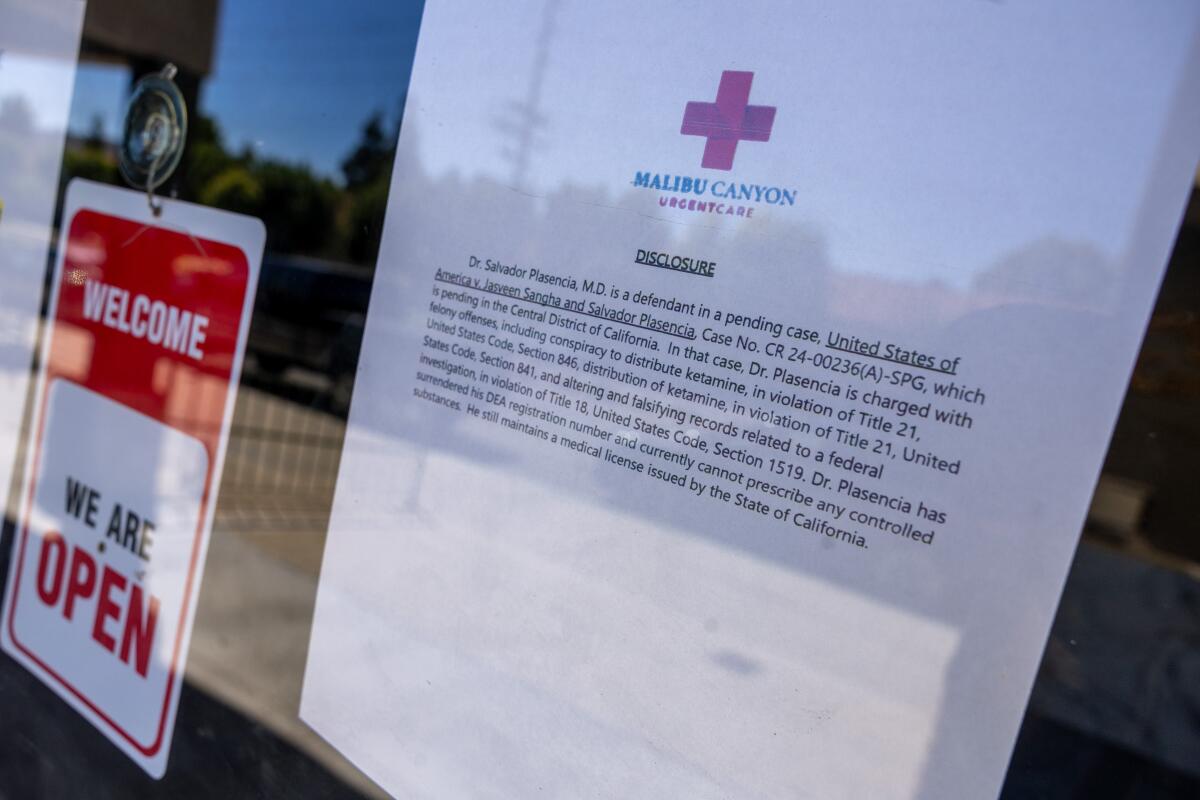
A physician charged with conspiring to distribute ketamine in the wake of Matthew Perry’s death is still seeing patients at the urgent care facility he operates in Calabasas.
Now facing felony charges, Dr. Salvador Plasencia is forbidden by the Drug Enforcement Administration from prescribing controlled substances, but he can, under certain conditions, continue to practice medicine, according to federal officials.
He has surrendered his DEA registration number, according to a sign posted Wednesday on the door of Malibu Canyon Urgent Care. The sign noted that he “still maintains a medical license issued by the State of California.”
Ciaran McEvoy, a spokesman for U.S. Atty. Martin Estrada’s office in Los Angeles, said Plasencia and another doctor charged in Perry’s death — Mark Chavez — have both surrendered their DEA licenses and therefore “cannot prescribe controlled substances.”
According to the state medical board, Plasencia’s medical license is active through October.
In announcing arrests in the death of “Friends” star Matthew Perry, authorities unveiled a disturbing narrative of the weeks leading up to his final day.
The 42-year-old physician, known as Dr. P., was charged last week in the October death of the “Friends” star, along with Chavez, Perry’s live-in personal assistant and two alleged drug dealers.
Plasencia is facing one count of conspiracy to distribute ketamine, seven counts of distribution of ketamine and two counts of altering and falsifying documents or records related to the federal investigation. If convicted, he faces 10 years for each ketamine-related charge and 20 years for each falsification charge.
Despite the charges, Plasencia is allowed to continue practicing medicine, his attorney, Stefan Sacks, told The Times.
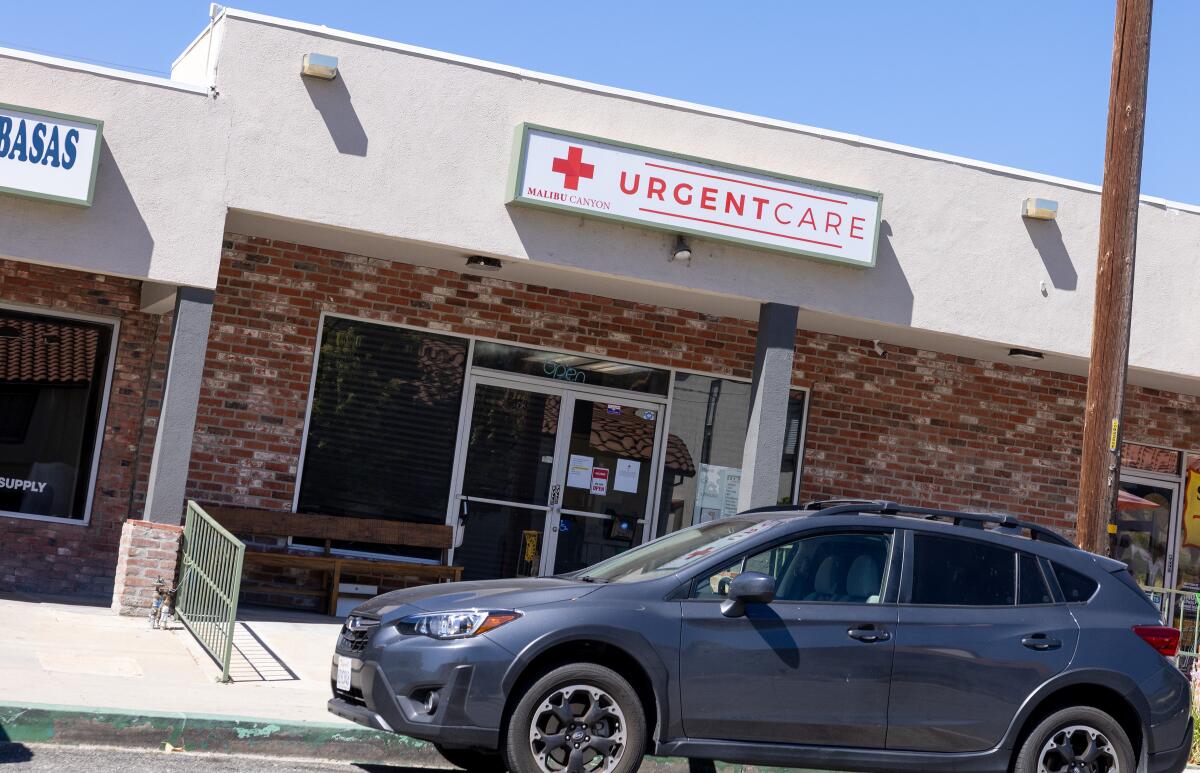
“The conditions are that he disclose in writing the existence of the pending federal case, and the fact that he cannot prescribe controlled substances. Patients are then required to sign a written consent form for treatment,” Sacks said. “So basically the requirement is disclosure and informed consent.”
On Wednesday, a woman approached the Calabasas clinic, read the notice on the door regarding the charges against Plasencia and then quickly returned to her vehicle.
Sacks said he would not comment further on the charges against Plasencia until he receives discovery from the U.S. attorney’s office detailing the allegations against his client. The physician has pleaded not guilty to all charges and was released in lieu of $100,000 bail. He is due back in court in October.
Federal authorities have filed drug charges against five individuals, including two doctors, in connection with the death of ‘Friends’ star Matthew Perry.
Perry, 54, was found dead in the hot tub of his Pacific Palisades home on Oct. 28. He died from “acute effects of ketamine,” according to the Los Angeles County Medical Examiner’s Office.
Plasencia is accused of acquiring the ketamine for Perry and acting outside the scope of professional practice. Authorities say he not only distributed the drug that killed the actor, he also taught Perry’s personal assistant, Kenneth Iwamasa, how to inject it into the actor. Iwamasa is accused of giving Perry the fatal dose.
Perry, who had long been open about his challenges with drug and alcohol addiction, had sought treatment for depression and anxiety before his death, going to a local clinic where he became addicted to intravenous ketamine, DEA Administrator Anne Milgram said. When clinic doctors refused to increase his dosage, he turned to outside sources, Milgram said.
In late September, about a month before Perry’s death, Plasencia learned the actor was interested in obtaining ketamine, a legal medication commonly used as an anesthetic, according to charging documents in the case. The drug can be abused recreationally, with users drawn to it for its dissociative effects.
After learning of Perry’s interest, Plasencia contacted Chavez, who previously operated a ketamine clinic, to obtain the drug to sell to the actor, authorities said. In text messages to Chavez, Plasencia discussed how much to charge Perry for the ketamine, stating, “I wonder how much this moron will pay” and “Lets find out,” according to court records.
Medical and law enforcement officials say the wealthy are financing the ketamine black market while more prescriptions and specialized clinics are emerging.
In the weeks that followed, the doctors distributed 20 vials of ketamine to Perry for $55,000 in cash, charging him $2,000 for a vial that cost Chavez $12, according to federal prosecutors and court records.
Court records show that by mid-October, Iwamasa also began obtaining ketamine for Perry from Jasveen Sangha, known as the “Ketamine Queen,” and Hollywood producer Erik Fleming, who provided the drug at a lower cost than the doctors were charging. Sangha sold about 50 vials of the drug to the actor, with Fleming delivering the product, for $11,000, authorities said.
Like Plasencia, Sangha, 41, is facing charges that include conspiracy to distribute ketamine, distribution of the drug resulting in death, possession with intent to distribute and altering and falsifying records related to a federal investigation, according to the indictment.
Fleming, 54, pleaded guilty this month to one count of conspiracy to distribute ketamine and one count of distribution of ketamine resulting in death.
Iwamasa, 59, pleaded guilty to a count of conspiracy to distribute ketamine causing death. He also admitted injecting Perry with ketamine without medical training, including performing several injections on the actor the day he died, authorities said.
More to Read
Sign up for Essential California
The most important California stories and recommendations in your inbox every morning.
You may occasionally receive promotional content from the Los Angeles Times.
